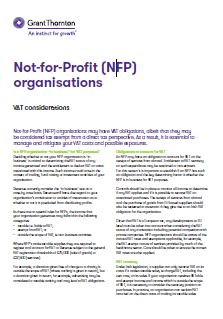Not-for-Profit (NFP) organisations may have VAT obligations, albeit that they may be considered tax exempt from a direct tax perspective.
As a result, it is essential to manage and mitigate your VAT costs and possible exposures.
Is a NFP organisation “in business” for VAT purposes? Deciding whether or not your NFP organisation is “in business” is critical to determining the VAT status of any income generated and the entitlement to deduct VAT on costs associated with this income. Such income could arise in the context of trading, fund raising or investment activities of your organisation.
The Revenue Commissioners currently consider the “in business” test on a case-by-case basis. The Revenue will have due regard to your organisation’s constitution or articles of association as to whether or not it is precluded from distributing profits.
As there are no special rules for NFPs, the income that your organisation generates may fall within the following categories:
- taxable i.e. liable to VAT;
- exempt from VAT; or
- outside the scope of VAT (i.e. non-business activities).
Where NFP’s make taxable supplies they are required to register and account for VAT to the Revenue subject to the general VAT registration thresholds of €75,000 (sale of goods) or €37,500 (services).
For example, a donation given free of charge to a charity is outside the scope of VAT (where nothing is given in return), but a donation given in return, for example, advertising may be considered a taxable activity and may lead to VAT obligations.
Obligations to account for VAT
An NFP may have an obligation to account for VAT on the receipt of services from abroad. Entitlement to VAT recovery on such expenditure may be restricted or non-existent. For this reason it is important to establish if an NFP has such an obligation and the key determining factor is whether the NFP is in business for VAT purposes.
Controls should be in place to monitor all income to determine if any VAT applies and if it is possible to recover VAT on associated purchases. The receipt of services from abroad and the purchase of goods from EU based suppliers should also be reviewed to ascertain if they give rise to an Irish VAT obligation for the organisation.
Given that VAT is a European tax, any developments at EU level must be taken into account when considering the VAT status of any transaction including potential competition with private companies. NFP organisations should be aware of the various VAT rates and exemptions applicable, for example, the VAT-exempt nature of services provided by much of the healthcare sector. Care should be taken to ensure the correct VAT rates are also applied.
VAT recovery
Under Irish legislation, a supplier can only recover VAT on its costs if it makes taxable sales, i.e. charge VAT (including the zero rate) on its sales. If your organisation receives VATable and exempt income and income which is outside the scope of VAT, it is necessary to consider the recovery position on purchases.
In practice, an organisation can reclaim VAT incurred on the direct costs of making its taxable sales. However, it cannot recover any VAT on the direct costs of making VAT-exempt sales or on costs which relate to income which is outside the scope of VAT and can only recover a proportion of the VAT incurred on its general costs using an apportionment method.
It is important to review your VAT apportionment calculations annually to determine which method is best suited to your particular circumstances. There are a number of acceptable methods available e.g. based on turnover, staff numbers, and space occupied.
There is also scope for some VAT relief under various VAT refund orders that apply to NFPs e.g. VAT on donated medical equipment etc. See Revenue information leaflet (CHY 10) for further details.
Compensation scheme for charities
A refund scheme will be introduced in 2019 to compensate charities for VAT they incur in 2018. The level of refund will be restricted in proportion to the level of non-public funding they receive. A capped fund of €5 million will be available and the scheme will be reviewed after three years. If total claims exceed €5 million, the individual claims will be paid on a pro-rata basis.
Importance of VAT to your organisation
- as VAT can be a major cost for most NFP organisations, it is important that a systematic approach is adopted;
- VAT should be considered in all areas of your organisation from the day-to-day issues to formulating future business plans;
- the implications of forming VAT groups, cost sharing groups or the restructuring of business processes should be considered; and
- property transactions should be given particular attention to avoid unnecessary costs.
Implementing VAT planning and structuring techniques can potentially make savings where it matters to your organisation.
VAT is an area which is heavily audited by the Revenue Commissioners. It is crucial that a NFP’s VAT position is ascertained to determine its obligations with regard to VAT on income and its scope for VAT recovery.

